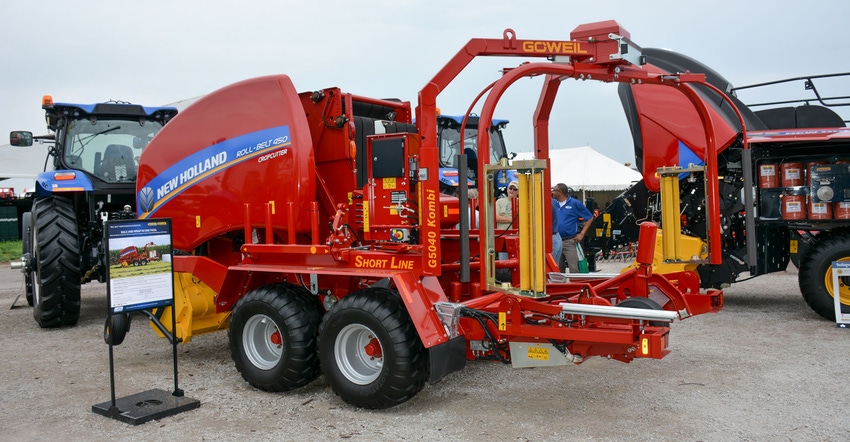
Diversification can mean different things. For Brett Davis, vice president of New Holland North America, it means standing out in a very competitive ag equipment market.
“The days of being everything to everybody all the time are probably over. You do have to have some focus, look at your brand and say, ‘How do I position this brand to be successful in the majority of markets that we serve?’” says Davis, who was named vice president of New Holland North America in the spring.
Developing unique solutions for customers, whether that be new technology in cabs or building off already successful machinery and branching out into other markets, is something Davis says will position New Holland for long-term success.
 BACK HOME: Being named vice president of New Holland North America is a homecoming for Davis — he is originally from Bucks County, Pa. (Photo courtesy of New Holland)
BACK HOME: Being named vice president of New Holland North America is a homecoming for Davis — he is originally from Bucks County, Pa. (Photo courtesy of New Holland)

One example is the company’s Braud line of grape harvesters. Davis says that he’d like to see the company build off the success of the harvester and branch out into other markets, such as fruits and vegetables in Florida and the Southeast.
When it comes to tractors, anything from 60 hp to 140 hp is the company’s sweet spot.
“I think in that midrange tractor we’re strong,” he says, adding that the company’s high horsepower tractors are also selling strong in western Canada.
Planting season pain
The late start to the planting season in the Midwest has led to sluggish equipment sales.
“Obviously, people aren’t buying equipment in the Midwest,” he says.
CNH Industrial, of which New Holland is part of, was pessimistic of its ag equipment sector for 2019 in its first-quarter report released in early May, blaming ongoing trade tensions and the late planting season in North America for sluggish sales.
While sales of its under-140hp tractors were up 4% in the first quarter, sales of higher horsepower tractors were down 3%. Combine sales in North America were up 28% but way down in Europe. The company does not separate performance by company, only by region where products are sold.
Davis says that he’s optimistic corn prices are going up and that farmers will hopefully be taking profits and investing in new equipment in the coming year. “Now we need to what the yields are going to be like,” he says.
New Holland’s North American headquarters are in New Holland, Pa., right in the middle of Lancaster County. Most of its hay tools are made in the New Holland plant, which employs 1,500 people.
Davis calls the company’s forage tools and the dairy industry that it serves the core of the New Holland brand. Even though the dairy industry is struggling, he says he’s optimistic the market will turn around.
“We continue to invest, we continue to build new products, we continue to tweak things,” he says. “This is a cyclical business. You can’t ride the highs too high and you can’t get too depressed of the lows. Our customers definitely feel it … but we’re in it for the long haul.”
Expanding outside ‘horseshoe’
Davis says the brand is strong in the Northeast, in the south and in California — the “horseshoe,” as some people call it.
The Midwest is not as strong for New Holland, he says, partly due to tough competition from brands such as John Deere and the fact that its combine has never been that strong in the Midwest or in the U.S. overall.
The company’s sister brand, Case, has a strong presence in the Midwest with its tractors. Davis says that he works well with Scott Harris, vice president of Case IH North America, as both came up through the financial services division. He says the companies have some crossover products and that they try to manage competition not only with other brands but with each other.
“We need to continue diversify the two brands and make sure we’re both leveraging our strengths and not trying to attack our weaknesses against each other,” he says. “We will never plan an aggressive expansion just to compete with our sister brands. We have to figure out what makes sense there.”
Farm Progress preview
If you’re expecting a big rollout of a brand-new combine, hay tool or tractor from New Holland at the upcoming Farm Progress Show, don’t hold your breath.
“I’ll be there,” he says. “We’re not projecting any major material releases at this point.”
But never say never.
“Perhaps we’ll bring some updated things, but you never know,” he says. “Maybe there will be a surprise.”
Coming home
Davis is originally from Bucks County, Pa., and spent part of his childhood in Philadelphia.
He graduated from Penn State with a degree in political science and a minor in business. After Penn State, Davis went to law school at Penn State Dickinson. He worked for law firms in Carlisle and Harrisburg, including the high-profile McNees, Wallace & Nurick LLC.
Davis joined CNH Industrial 23 years ago and has worked in a variety of management roles. He’s worked for the company in Europe, South America and at Case New Holland’s industrial plant in Racine, Wis.
He was most recently president of CNH Industrial Capital LLC, where he was responsible for the oversight and management of CNH Industrial Capital for North America.
Even though he didn’t grow up on a farm and lacks technical expertise on equipment, Davis says the company has lots of knowledgeable people he can lean on.
“We want to have this entrepreneurial spirt,” he says. “We want to be at the forefront of innovation. We want to be at the forefront of sustainability. It’s a powerful brand.”
About the Author(s)
You May Also Like






